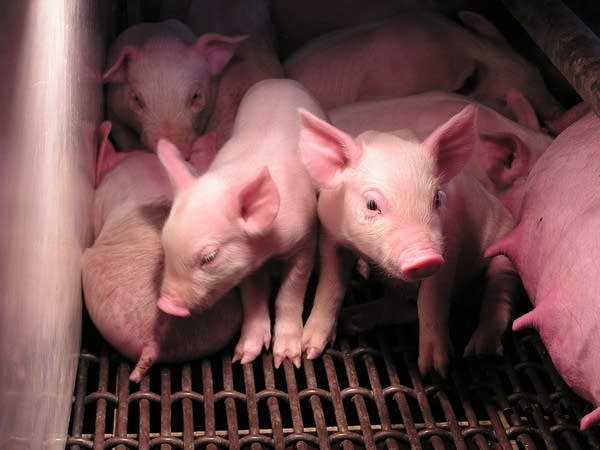Pork industry assures customers pork is safe
Go Deeper.
Create an account or log in to save stories.
Like this?
Thanks for liking this story! We have added it to a list of your favorite stories.

(AP) - U.S. pork producers, responding to a swine flu outbreak that has escalated into a public health emergency, said Sunday their product is safe and that consumers cannot catch the virus by eating properly cooked food.
The industry-funded National Pork Board said it "wishes to reassure the public that pork is safe and will continue to be safe to consume."
The statement comes as multiple nations increase their screening of pigs and pork imports from the Americas or are banning them outright as the virus is said to have killed up to 86 people and likely sickened up to 1,400 since April 13 in Mexico.
U.S. officials say the virus has been found in New York, California, Texas, Kansas and Ohio, but so far no fatalities have been reported.
Turn Up Your Support
MPR News helps you turn down the noise and build shared understanding. Turn up your support for this public resource and keep trusted journalism accessible to all.
The stakes are high for U.S. pork producers, which export nearly $5 billion worth of products each year.
The stakes are high for U.S. pork producers, which export nearly $5 billion worth of products each year.
The organization pointed to a statement by the U.S. Centers for Disease Control and Prevention that swine influenza viruses "are not spread by food," and that eating properly handled pork and cooked pork products is safe since the virus dies when cooked at temperatures of 160 degrees or higher.
The pork producers' group also noted that public health officials believe the virus is spreading from person to person, with no evidence indicating any of the illnesses resulted from close contact with pigs.
However, Russia has banned the import of meat products from Mexico, California, Texas and Kansas. South Korea has said it will increase the number of its influenza virus checks on pork products from Mexico and the U.S.
Smithfield Foods Inc., the largest U.S. pork producer, said it has found no signs or symptoms of swine flu in its herds or workers at the company's joint ventures in Mexico.
The Smithfield, Va.-based company said those operations will submit samples from swine herds to The University of Mexico for testing.
The company also noted that its joint ventures in Mexico routinely administer flu virus vaccinations to their herds and conduct monthly tests for the presence of swine flu.
The National Pork Board's president, Steve Weaver, said the organization is urging pork producers to take "biosecurity" precautions "to ensure the good health of our animals and for all those who provide care for the animals."
The board recommended that pork growers consider limiting access to their farms to only employees, veterinarians and essential service workers, and preventing employees with symptoms of flu-like illnesses from contacting pigs, or other farm workers.
The group also suggested producers consider keeping international visitors, or others who have recently traveled to places like Mexico, from coming onto farms, and ensure that workers shower before and after work, and take precautions such as not wearing farm shoes and other work clothing away from the farm.
Representatives from two other major U.S. pork producers - Springdale, Ark.-based Tyson Foods Inc. and Austin, Minn.-based Hormel Foods Corp. - did not return messages seeking comment Sunday on the swine flu outbreak.
Nearly a quarter of the pork produced in the U.S. goes abroad, up from only 3 percent in 1990, according to the U.S. Meat Export Federation. Last year, farmers shipped a record 2 million metric tons of pork valued at nearly $4.9 billion.
Japan was the top U.S. export customer, followed by Hong Kong/China, Mexico, Canada and Russia.
(Copyright 2009 by The Associated Press. All Rights Reserved.)
Dear reader,
Political debates with family or friends can get heated. But what if there was a way to handle them better?
You can learn how to have civil political conversations with our new e-book!
Download our free e-book, Talking Sense: Have Hard Political Conversations, Better, and learn how to talk without the tension.




